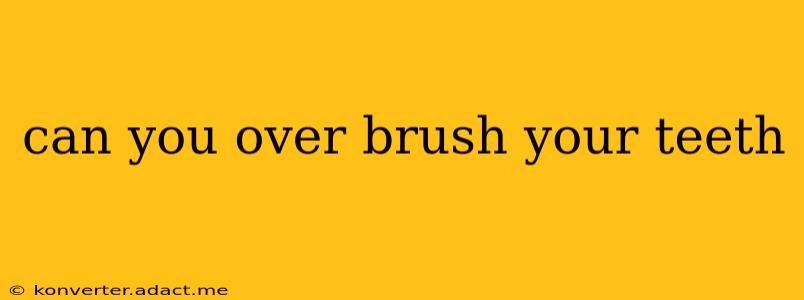Can You Over Brush Your Teeth? The Truth About Brushing Too Hard
Yes, you absolutely can over-brush your teeth. While diligent brushing is crucial for maintaining good oral hygiene, excessive brushing can lead to a range of problems, damaging your teeth and gums. This article will explore the potential consequences of over-brushing and offer guidance on achieving optimal oral health without harming your teeth.
What does over-brushing look like?
Over-brushing isn't just about brushing for too long. It encompasses several factors:
- Brushing too hard: Applying excessive pressure while brushing is a major culprit. This aggressive scrubbing wears away tooth enamel, the protective outer layer of your teeth.
- Using a hard-bristled toothbrush: Hard bristles are more likely to cause damage, especially when combined with forceful brushing.
- Brushing too frequently: While brushing twice a day is recommended, brushing more often than that, especially with aggressive techniques, can be detrimental.
What are the consequences of over-brushing?
Several issues can arise from over-brushing your teeth:
- Tooth enamel erosion: This is the most significant risk. Eroded enamel makes teeth more sensitive to hot and cold temperatures, and increases the risk of cavities and other dental problems.
- Gum recession: Aggressive brushing can wear away gum tissue, exposing the roots of your teeth and making them more vulnerable to decay and sensitivity. Receding gums can also lead to periodontal disease.
- Tooth sensitivity: As enamel and gums are damaged, your teeth become more sensitive to temperature changes, acidic foods, and sweets.
- Abrasion: This is the wearing away of the tooth structure due to friction from brushing too hard. It can lead to notches or grooves on the teeth's surface.
How long should you brush your teeth?
The general recommendation is to brush your teeth for two minutes, twice a day, using a soft-bristled toothbrush and fluoride toothpaste. This duration allows sufficient time to thoroughly clean all surfaces of your teeth.
What type of toothbrush should I use?
Always opt for a soft-bristled toothbrush. Hard bristles are more likely to cause damage to your enamel and gums. Consider electric toothbrushes with a built-in timer to help you brush for the recommended two minutes.
What if I think I’ve been over-brushing?
If you suspect you've been over-brushing, schedule an appointment with your dentist immediately. They can assess the damage and recommend appropriate treatment. Early intervention is crucial in preventing further complications.
How can I avoid over-brushing?
- Use a soft-bristled toothbrush: This is the most critical step.
- Brush gently: Avoid scrubbing; instead, use small, circular or back-and-forth motions.
- Use a timer: Ensure you brush for the full two minutes, but don't exceed this.
- Choose the right toothpaste: Opt for a fluoride toothpaste, as fluoride helps strengthen enamel.
- Don't brush too often: Twice a day is sufficient for most people.
By following these guidelines, you can maintain excellent oral hygiene without harming your teeth and gums. Remember, gentle and consistent brushing is key to a healthy smile. Regular dental check-ups are also essential for monitoring your oral health and addressing any potential issues early on.
